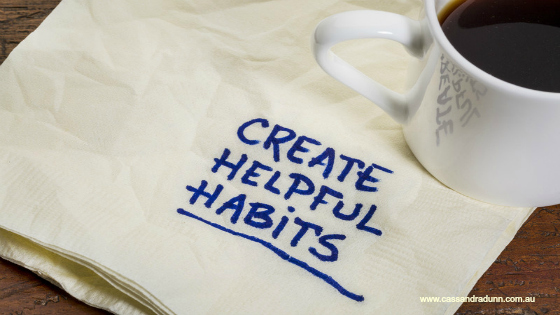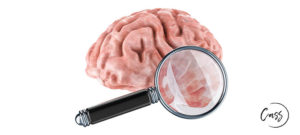
As much as 40-45% of what we do every day is done out of habit. It’s a bit scary just how much of our lives happen on auto-pilot, but it also makes perfect sense when you consider how much time and energy we would waste if we had to decide every day what to do, when and how to do it. With repetition, our brain develops a ‘shortcut’ so that we no longer have to think consciously about what we’re doing, and our thinking mind is freed up to focus on other more important things. Perfect!
Unless, of course, some of those habits aren’t very good for you and you’d prefer to break them or replace them with a healthier habit.
From studying the neuroscience of habits, we know that every behaviour has a ‘cue’ or a trigger that instigates it, and is followed by a reward. Rewards give us a strong hit of dopamine (that’s the feel good neurotransmitter in our brains), so that after a while just thinking about the behaviour triggers the release of dopamine. This means that the first few times you do something, it might very well be a conscious decision; but after only a few occurrences, that combination of trigger, behaviour and reward becomes quite automatic and is instigated by a part of your brain that has nothing to do with conscious choice. With these processes going out outside of our conscious awareness, unhelpful habits can seem impossible to break.
This is why, when it comes to breaking a habit, it’s not enough to just focus on the behaviour itself but to look at all three factors in combination. Here are five tips to help you over-ride your impulses and establish healthy habits instead.
1. Practise mindfulness
Being mindful is like pressing a pause button between the stimulus (the craving you feel or the urge to do something) and the response (i.e., your habitual behaviour). This gives you a moment to consider a different response when you are hit with that craving. We psychologists use the term ‘surfing the urge’ to describe how mindfulness can help you ‘ride out’ those strong sensations in your body without giving in to them.
2. Identify your triggers
The trigger for your craving might be a time of day, particular places, people, emotions or even other behaviours that become paired together (such as having a cigarette every time you have a coffee). It can be helpful to keep a log of every time you experience the urge or the habit you’re trying to break. You should fairly quickly identify a pattern and know what your cues or triggers are.
3. Choose a new reward
Once you know the trigger, it’s important to also get clear on the specifics of your rewards. If your habit is to have a sweet snack at 3pm, the reward might be the quick energy boost or satisfying your hunger or alleviating boredom. Sometimes part of the reward is social connection (gathering in the tea room at work). Once you know that your reward is, you can find other activities that will help you to achieve it that don’t involve engaging in your bad habit.
4. Use repetition to your advantage
Just as your old habit started off as a conscious choice and quickly became unconscious, by repeating your new preferred activity every time you experience your trigger, the new behaviour will also start to become automatic. Eventually the new pattern will become habitual and the old associations will be suppressed.
5. Remember – progress not perfection!
Habits aren’t formed overnight, nor are they broken so easily. If you expect immediate success, any slip-up can feel like a failure and send you straight back to square one. By forgiving yourself for slip-ups, you’re more likely to get back on track quickly and eventually ditch those bad habits for good.

This article was first published inside the member community at www.tiffxo.com





